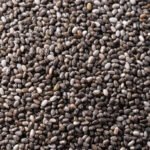Chia oil, created from Salvia hispanica, has become a staple in nutrition and wellbeing, continuing the Aztec and Mayan custom of the seed’s enormous medical advantages. Veggie lovers and vegetarians look for this oil for its high omega-3 unsaturated fat fixation, which is uncommon in plant oils.
Elevated degrees of alpha-linolenic corrosive (ALA), a fundamental omega-3 unsaturated fat, make chia oil stick out. This supplement advances solid veins, decreases aggravation, and brings down the gamble of constant sicknesses, including coronary illness and joint inflammation. ALA upholds mind well-being, mental capability, and sadness counteraction.
Flavonoids and phenolic parts make chia oil cancer prevention agents rich. Cell reinforcements forestall oxidative pressure and aggravation, which are related to maturing, malignant growth, and coronary illness. These cancer prevention agents additionally settle the oil, saving its nutritious worth when put away for the long term.
Healthfully rich and flexible, the oil is utilized in cooking. Its gentle, nutty flavor makes it ideal for salad dressing, simmered vegetable sprinkles, and smoothies. Chia oil is more grounded than polyunsaturated oils since it tends to be cooked at moderate temperatures without shaping perilous synthetic substances.
Chia oil moisturizes, soothes, and prevents aging in skin and hair. It absorbs rapidly and is lightweight, making it ideal for skin moisture without clogging pores. The oil strengthens and shines hair follicles, making hair healthier and shinier. This includes anti-aging skin routines, where its antioxidant capabilities reduce fine lines and wrinkles.
Chia is a sustainable crop. It thrives in arid locations and promotes sustainable agriculture since it needs less water than most seeds and grains. Cold-pressing chia seed oil preserves its nutritious qualities by preventing deterioration at higher temperatures.

Chia oil capsules are a popular option for individuals who don’t eat fish to get ALA omega-3s. These concentrated supplements directly improve omega-3 fatty acid consumption, demonstrating this ancient seed oil’s versatility and modern uses.
Chia oil has many health benefits, but it is high in calories and fats, therefore it should be used cautiously like any other nutritional oil. Adding chia oil to a diet requires moderation. Chia oil should be added cautiously, considering dietary fat and health demands, especially for people with excessive triglycerides or a low-fat diet.
Chia production has a modest environmental impact compared to other crops; however, land utilization and farming practices must be considered. The popularity of chia oil should not lead to unsustainable farming practices that reduce its ecological benefits.
Chia oil’s transformation from a nutritious supplement to a cooking and cosmetic ingredient shows its versatility. Reintegrating ancient foods into modern health and dietary habits offers significant health benefits and meets modern needs for sustainable, varied, and nutritionally dense food sources. Chia oil is a potent, natural product promoting holistic health, whether for its nutritional advantages or skin and hair beautifying properties. Each drop of chia seed oil continues its ancient nutritious legacy.
Chia oil is a prime illustration of how traditional resources may be repurposed for modern health and environmental demands as plant-based and sustainable goods become more popular. It promotes sustainable agriculture and individual wellness by being part of everyday diets. Since it meets health and ecological requirements, chia oil is an essential part of future-focused dietary planning, promoting responsible and healthful consumption.
Finally, chia oil is a flexible product that may be used in cooking, cosmetics, and as a nutritious supplement. The relevance of sustainable and nutritious products like chia oil is growing, promising healthier lifestyles and a healthier planet. Eating such superfoods promotes a balanced diet and sustainability, benefiting our bodies and the environment.
Exploring Chia: The Tiny Seed with Mighty Nutritional Benefits
The mint family’s Salvia Hispanica plant produces chia seeds in Mexico and Guatemala. The Aztecs and Mayans revered “chia” because it meant “strength” in their language, indicating the superfood’s tremendous energy and stamina. Chia seeds are part of many healthy diets due to their comprehensive nutritional profile.
Chia seeds are small but nutritious. They are mostly known for their omega-3 fatty acid content, especially alpha-linolenic acid. This is crucial since the body cannot generate omega-3 lipids. Chia seeds are essential for heart, brain, and anti-inflammatory health. Unlike flaxseeds, chia seeds provide a simple omega-3 boost without grinding.
Another benefit of chia seeds is soluble fiber. This fiber causes chia seeds to swell and gel in liquid. This characteristic promotes regular bowel motions and supports intestinal health as a prebiotic. The fiber-rich gel slows carbohydrate digestion, lowering blood sugar and preventing type 2 diabetes and heart disease.
Additionally, chia seeds are rich in nutrients. They are rich in magnesium, which is needed for over 300 physiological activities, including muscular function, protein synthesis, and mood control. They are also high in manganese, which improves digestion of amino acids, cholesterol, carbs, and phosphorus, vital for bone health.
Chia seeds are rich in antioxidants, which protect cells from free radical damage. Chia seed antioxidants include chlorogenic acid, caffeic acid, myricetin, quercetin, and kaempferol, which promote heart, liver, and cancer prevention. Chia seeds last longer than other fatty acid-rich seeds due to these components.
Chia seed protein is also noteworthy. It is complete, with all nine essential amino acids. Chia seeds can help vegetarians and vegans receive more protein, which is rare in plant-based protein sources.
Chia seeds’ mild, nutty flavor makes them easy to incorporate into the diet. They thicken sauces, replace eggs, and add to yogurt, smoothies, soups, and baked goods. They can be used in homemade protein bars, pancakes, and bread, making them versatile.

Chia seeds are tiny yet highly hydrating, which boosts endurance. This makes them popular with athletes who drink chia gel to stay hydrated and energized throughout long competitions. Seeds absorb twelve times their weight in liquid, retaining electrolytes and hydration.
Chia seeds grow well in arid locations and require little water, making it a sustainable crop for the future. They improve soil health and are used in crop rotation programs to minimize soil depletion.
Chia seeds are harmless and rarely produce allergic responses, although they should be administered slowly to test tolerance. They absorb a lot of water, so stay hydrated when eating them, dehydrated ones.
Chia seeds are environmentally sustainable, easy to incorporate into diets, and healthy. These tiny seeds’ nutritional value and historical significance as a warrior diet and superfood demonstrate their longevity and nutritional potency. Chia seeds are a multipurpose food that can enhance fiber, protein, omega-3 fatty acid intake, and general wellness.






Leave a Reply